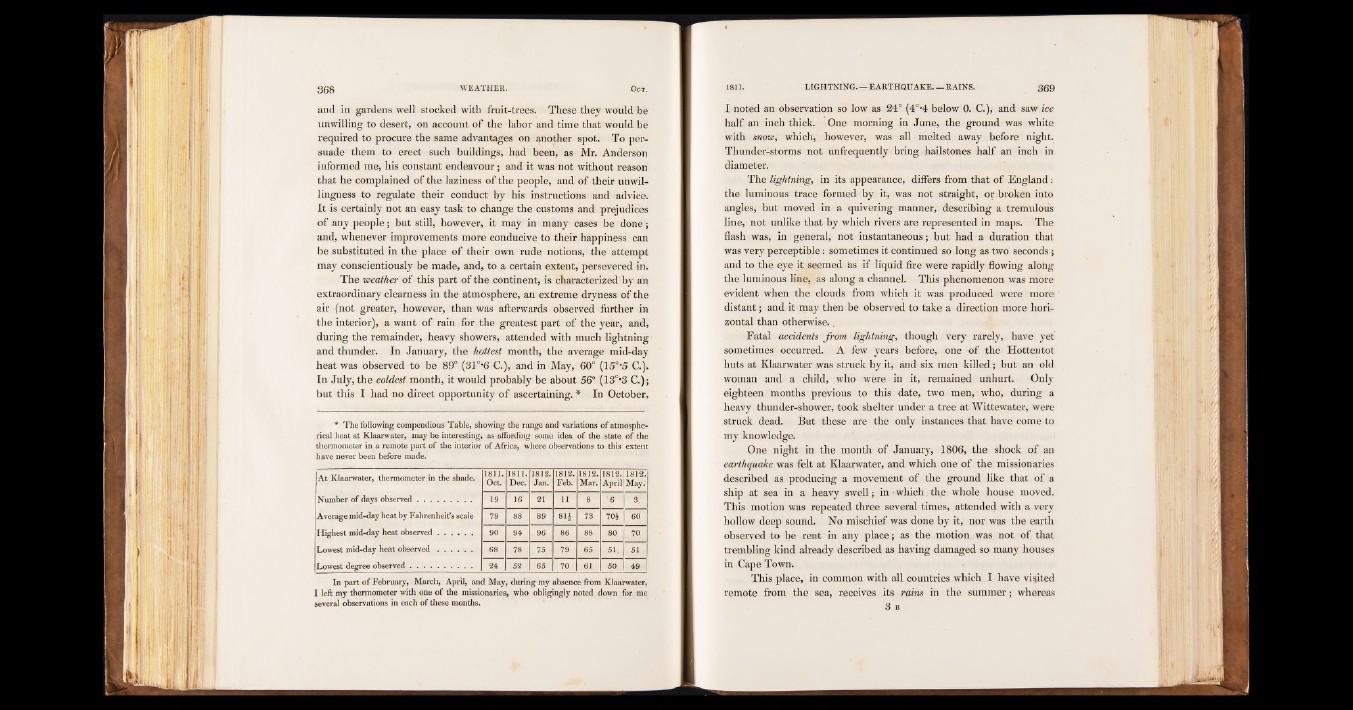
and in gardens well stocked with fruit-trees. These they would be
unwilling to desert, on account of the labor and time that would be
required to procure the same advantages on another spot. To persuade
them to erect such buildings, had been, as Mr. Anderson
informed me, his constant endeavour; and it was not without reason
that he complained of the laziness of the people, and of their unwillingness
to regulate their conduct by his instructions and advice.
It is certainly not an easy task to change the customs and prejudices
of any people; but still, however, it may in many cases be done;
and, whenever improvements more conducive to their happiness can
be substituted in the place of their own rude notions, the attempt
may conscientiously be made, and, to a certain extent, persevered in.
The weather of this part of the continent, is characterized by an
extraordinary clearness in the atmosphere, an extreme dryness of the
air (not greater, however, than was afterwards observed further in
the interior), a want of rain for the greatest part of the year, and,
during the remainder, heavy showers, attended with much lightning
and thunder. In January, the hottest month, the average mid-day
heat was observed to be 89° (31°'6 C.), and in May, 60° (150-5 C.).
In July, the coldest, month, it would probably be about 56° (13°'3 C.);
but this I had no direct opportunity of ascertaining. * In October,
* The following compendious Table, showing the range and variations of atmospherical
heat at Klaarwater, may be interesting, as affording some idea of the state of the
thermometer in a remote part of the interior of Africa, where observations to this extent
have never been before made.
At Klaarwater, thermometer in the shade.
1811.
1811.
1812.
1812.
1812.
1812.11812.
Oct.
Dec.
Jan.
Feb.
Mar.
April May.
Number of days observed..........................
Average mid-day heat by Fahrenheit’s scale
Highest mid-day heat observed.................
Lowest mid-day heat o b se rv ed ................
Lowest degree observed.............................
19 16 21 11 8 ' 6 I 3.
79 88 89 81* 73 70* | 60
90 94 96 86 88 80 70
68 78 75 I 79 65 51. 51
24 52 65 70 61 50 49
In part o f February, March, April, and May, during my absence from Klaarwater,
I left my thermometer with one of the missionaries, who obligingly noted down for me
several observations in each of these months.
I noted an observation so low as 24° (4°*4 below 0. C.), and saw ice
half an inch thick. One morning in June, the ground was white
with snow, which, however, was all melted away before night.
Thunder-storms not unfrequently bring hailstones half an inch in
diameter.
The lightning, in its appearance, differs from that of England:
the luminous trace formed by it, was not straight, or broken into
angles, but moved in a quivering manner, describing a tremulous
line, not unlike that by which rivers are represented in maps. The
flash was, in general, not instantaneous; but had a duration that
was very perceptible: sometimes it continued so long as two seconds;
and to the eye it seemed as if liquid fire were rapidly flowing along
the luminous line, as along a channel. This phenomenon was more
evident when the clouds from which it was produced were more
distant; and it may then be observed to take a direction more horizontal
than otherwise..
Fatal accidents from lightning, though very rarely, have yet
sometimes occurred. A few years before, one of the Hottentot
huts at Klaarwater was struck by it, and six men killed; but an old
woman and a child, who were in it, remained unhurt. Only
eighteen months previous to tills date, two men, who, during a
heavy thunder-shower, took shelter under a tree at Wittewater, were
struck dead. But these are the only instances that have come to
my knowledge.
One night in the month of January, 1806, the shock of an
earthquake was felt at Klaarwater, and which one of the missionaries
described as producing a movement of the ground like that of a
ship at sea in a heavy swell; in which the whole house moved.
This motion was repeated three several times, attended with a very
hollow deep sound. No mischief was done by it, nor was the earth
observed to be rent in any place; as the motion was not of that
trembling kind already described as having damaged so many houses
in Cape Town.
This place, in common with all countries which I have visited
remote from the sea, receives its rains in the summer; whereas
3 B